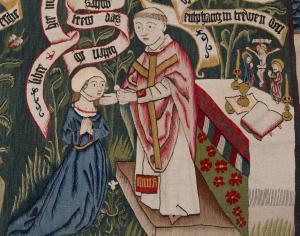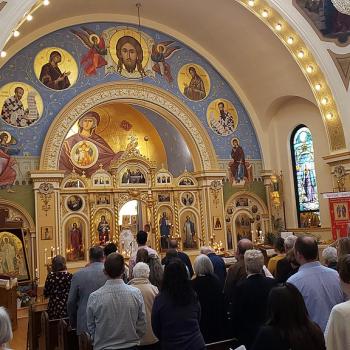
Politics requires prudence, realizing what is and is not possible in a given context. Politicians have to make deals and temper their ideals in order to work for the common good. They must recognize the implications of their legislation, and if imposing a particular law would make things worse, even if it follows from a proper moral principle, they must reject that law and preserve the greater good. This is why St. Thomas Aquinas did not support legislation which would outlaw prostitution. It was Aquinas’ prudential reading of the situation. Prudential decisions can be erroneous, but they do not indicate one’s intention. Aquinas did not support prostitution despite the fact he did not think prostitution should be outlawed. This is why the Catholic Church has given Catholic politicians leeway in their prudential decisions, and would not forbid them communion even if their prudential decision looked suspect. Despite debating with Catholic politicians as to what is the best legislative policy to deal with various social evils, the church welcomes them to the eucharistic feast with the same warning that it gives everyone else: appraise the state of your soul and judge for yourself if you are in a state of grace, free to receive communion. “The practice of the Church is to accept the conscientious self-appraisal of each person.” [1]
This is why Pope after Pope has given communion to those whose political stand in regards abortion has been called “pro-choice.” The eucharist should not be used as a weapon for political control. It should not be used to enforce particular prudential understanding of how to deal with important moral concerns. To turn it into a weapon to enforce particular prudential political decisions is to ignore the lessons the church has learned throughout its history and to resort to the kind of errors attributable to Novatians, Donatists, or in more recent times, Jansenists, whose rigorous legalism left little to no room for charity or grace. As Archbishop Levada stated in 2004, it is rare for the church to act differently and outright forbid people to come and receive communion:
Who is to judge the state of a Catholic communicant’s soul? Who may make the decision to refuse Holy Communion? Ministers of Holy Communion may find themselves in the situation where they must refuse to distribute Holy Communion to someone in rare cases, such as in cases of a declared excommunication, interdict, or an “obstinate persistence in manifest grave sin.” [2]
Prudential political decisions, by themselves, do not represent manifest grave sin. Aquinas was not manifesting grave sin because of the way he thought prostitution should be supported by law. Intention is important, even when dealing with abortion. Pro-choice Catholic politicians can agree that abortion is wrong, but they might think the solution to the problem of abortion cannot be had through legislation, that legislation would only make the situation worse (due, in part, to the unforeseen, or even foreseen, consequences of legislation made to make abortion illegal). Thus, Cardinal Levada recognized that pro-choice politicians should not be judged with the intention of supporting and promoting abortion merely because of their political stand:
Can a politician be guilty of formal cooperation in evil? If the person intends to promote the killing of innocent life, s/he would be guilty of such sinful cooperation. If such an intention were present, even a voter could be guilty of such cooperation. But this seems unlikely as a general rule. Should every Catholic politician who has voted for an unjust law favoring abortion be judged to have this intention? I hope not. [3]
And he pointed out that this is because the church recognized, through Aquinas, that sometimes the state must permit various evils in order to prevent greater evils:
Catholics in political life can be helped by a deeper understanding of the longstanding recognition in Catholic moral teaching that those who make and interpret the law are not always able to deal with ideal or perfect solutions. St. Thomas Aquinas wrote about the principle of “toleration” of evil in his 13th-century Summa: “Human government is derived from the divine and should imitate it. God, although he is omnipotent and perfectly good, permits some evils to occur in the universe, evils which he could prohibit. He does this because if these evils were removed, greater evils would ensue. Thus also in human government, those who rule properly should tolerate certain evils lest other good things are lost and even worse evils come about.” (Summa Theologiae, Secunda Secundae, q. 10, art. 11 c). [4]
Thus, whether or not one agrees with pro-choice politicians in regards their prudential understanding of how to deal with abortion, the church recognizes that their decision itself does not indicate their desire or wish to promote abortions. They are not to be seen as formally cooperating for evil because of their stand, and so they are not forbidden communion. Pope Leo XIII, for example, thought other evils also could not be curbed by legislation, and by saying such, he was not affirming those evils but thought there could be and should be other means to deal with them:
Furthermore, if anyone will diligently examine into the causes of the evils of our day, he will find that they arise from this, that as charity towards God has grown cold, the mutual charity of men among themselves has likewise cooled. Men have forgotten that they are children of God and brethren in Jesus Christ; they care for nothing except their own individual interests; the interests and the rights of others they not only make light of, but often attack and invade. Hence frequent disturbances and strifes between class and class: arrogance, oppression, fraud on the part of the more powerful: misery, envy, and turbulence among the poor. These are evils for which it is in vain to seek a remedy in legislation, in threats of penalties to be incurred, or in any other device of merely human prudence.[5]
Of course, this does not mean one cannot and should not employ the powers of the state to deal with the evils of society; the state is called to work for justice, and legislative powers are to be used to enforce justice. What must be determined is where the state can do so effectively and with legitimate means to do so, and politicians each weigh in and determine that for themselves based upon their own particular understanding of the situation at hand.
Catholic politicians are expected to work for and promote the common good, to do so based upon what they think is prudentially best. “ Consequently, Catholic politicians and legislators, conscious of their grave responsibility before society, must feel particularly bound, on the basis of a properly formed conscience, to introduce and support laws inspired by values grounded in human nature.” [6] In doing so, they must remember they are a part of a secular society, not a theocracy, and so prudential decisions must take into consideration what is or is not possible based upon the norms which govern their society.
Cardinal Turkson, therefore, was following basic Catholic principles when he said that pro-choice politician, such as President Biden, should not normally be denied communion. He follows Pope Francis, who has indicated the same thing several times during his pontificate, making it clear that the eucharist should not be treated as some sort of prize. It is medicine for the soul, for those who, after self-judgment, feel they are ready to receive it, just as the Congregation For Divine Worship and the Discipline of the Sacrament indicated in 2004:
The Church’s custom shows that it is necessary for each person to examine himself at depth, and that anyone who is conscious of grave sin should not celebrate or receive the Body of the Lord without prior sacramental confession, except for grave reason when the possibility of confession is lacking; in this case he will remember that he is bound by the obligation of making an act of perfect contrition, which includes the intention to confess as soon as possible. [7]
The church makes it clear the judgement is to be self-made. Except for rare occasions, those coming to receive are to be given communion; they are certainly not to be judged by the minister of communion who does not know their conscience. This is the kind of judgment Jesus consistently said we could not and should not make! We can judge actions, we can make our own prudential decisions and show why we think others are wrong in theirs, but we cannot judge the state of another’s soul. Even if someone held a defective understanding of the morality concerning abortion itself, this would not deny them access to communion, though their bishop might want to engage them pastorally to correct their moral understanding (which, again, does not indicate how that moral position is to be embraced in prudential decisions):
On the case of persons who do not accept some teaching of the faith that has been definitively (infallibly) taught necessarily connected with divine Revelation, but not expressly and categorically set forth as divinely revealed, their rejection of such a truth (e.g. the evil of abortion) would affect and diminish their full communion with the faith and life of the Church. In such cases, the practice of the Church does not per se exclude such persons from the reception of the sacraments (cf. “Some Brief Responses to Questions Regarding the Professio Fidei,” no. 6; in Proclaiming the Truth of Jesus Christ [Papers from the Vallombrosa Meeting], USCCB Publications, 2000). Rather, the Church invites such persons to a fuller understanding of the truth and a conversion of mind and heart to embrace the fullness of Christ’s teaching. In this case, the bishop will want to use the virtue of prudence in judging how best to ensure the Catholic person’s understanding of the situation for their Catholic faith. [8]
The eucharist gives us much grace, transforming those who are ready to receive it, so that they can be made holy. We must not misunderstand holiness solely along moralistic lines:
This appeal to the moral value of spiritual worship should not be interpreted in a merely moralistic way. It is before all else the joy-filled discovery of love at work in the hearts of those who accept the Lord’s gift, abandon themselves to him and thus find true freedom. The moral transformation implicit in the new worship instituted by Christ is a heartfelt yearning to respond to the Lord’s love with one’s whole being, while remaining ever conscious of one’s own weakness. This is clearly reflected in the Gospel story of Zacchaeus (cf. Lk 19:1-10). After welcoming Jesus to his home, the tax collector is completely changed: he decides to give half of his possessions to the poor and to repay fourfold those whom he had defrauded. The moral urgency born of welcoming Jesus into our lives is the fruit of gratitude for having experienced the Lord’s unmerited closeness. [9]
The moral transformation is an interior one, a transformation of the person so that they personally follow the Lord with their heart. The true moral teaching of Christ is to the two-fold law of love. This is what the eucharist should increase in the recipient. Those, however, who confuse this with a legalistic morality have misunderstood communion and are themselves in need of pastoral engagement to make sure they do not hold a defective understanding of the church’s doctrines.
The eucharist is the sacrament of Christ. Christ came into the world, not to judge and condemn sinners, but to save them. The eucharist should not be used as a weapon to force prudential legislative decisions upon society. To use the eucharist in this fashion, to abuse Christ in this fashion, it to go against Christ himself, who in the desert, rejected using such power and authority when he was tempted to do so. The eucharist should not be turned into an ideological tool, but rather, it should always be the welcome sacrament of Christ, given to all believers who come to him after they have made their own self-examination and see that they come to him in a state of grace and with love.
[1] Archbishop William J Levada, “Theological Reflections On Catholics In Political Life And The Reception If Holy Communion” (6-13-2004).
[2] Archbishop William J Levada, “Theological Reflections On Catholics In Political Life And The Reception If Holy Communion.”
[3] Archbishop William J Levada, “Theological Reflections On Catholics In Political Life And The Reception If Holy Communion.”
[4] Archbishop William J Levada, “Theological Reflections On Catholics In Political Life And The Reception If Holy Communion.”
[5] Pope Leo XIII, Mirae Caritatis. Vatican translation. ¶11.
[6] Pope Benedict XVI, Sacramentum Caritatis. Vatican translation. ¶83.
[7] Congregation For Divine Worship and The Discipline of the Sacrament, Redemptionis Sacramentum. Vatican translation. ¶81.
[8] Archbishop William J Levada, “Theological Reflections On Catholics In Political Life And The Reception If Holy Communion” (6-13-2004) [Retrieved USCCB website, https://www.usccb.org/issues-and-action/faithful-citizenship/church-teaching/theological-reflections-tf-bishops-politicians-2004-06-13 10-6-2021].
[9] Pope Benedict XVI, Sacramentum Caritatis. Vatican translation. ¶82.
Stay in touch! Like A Little Bit of Nothing on Facebook.
If you liked what you read, please consider sharing it with your friends and family!













